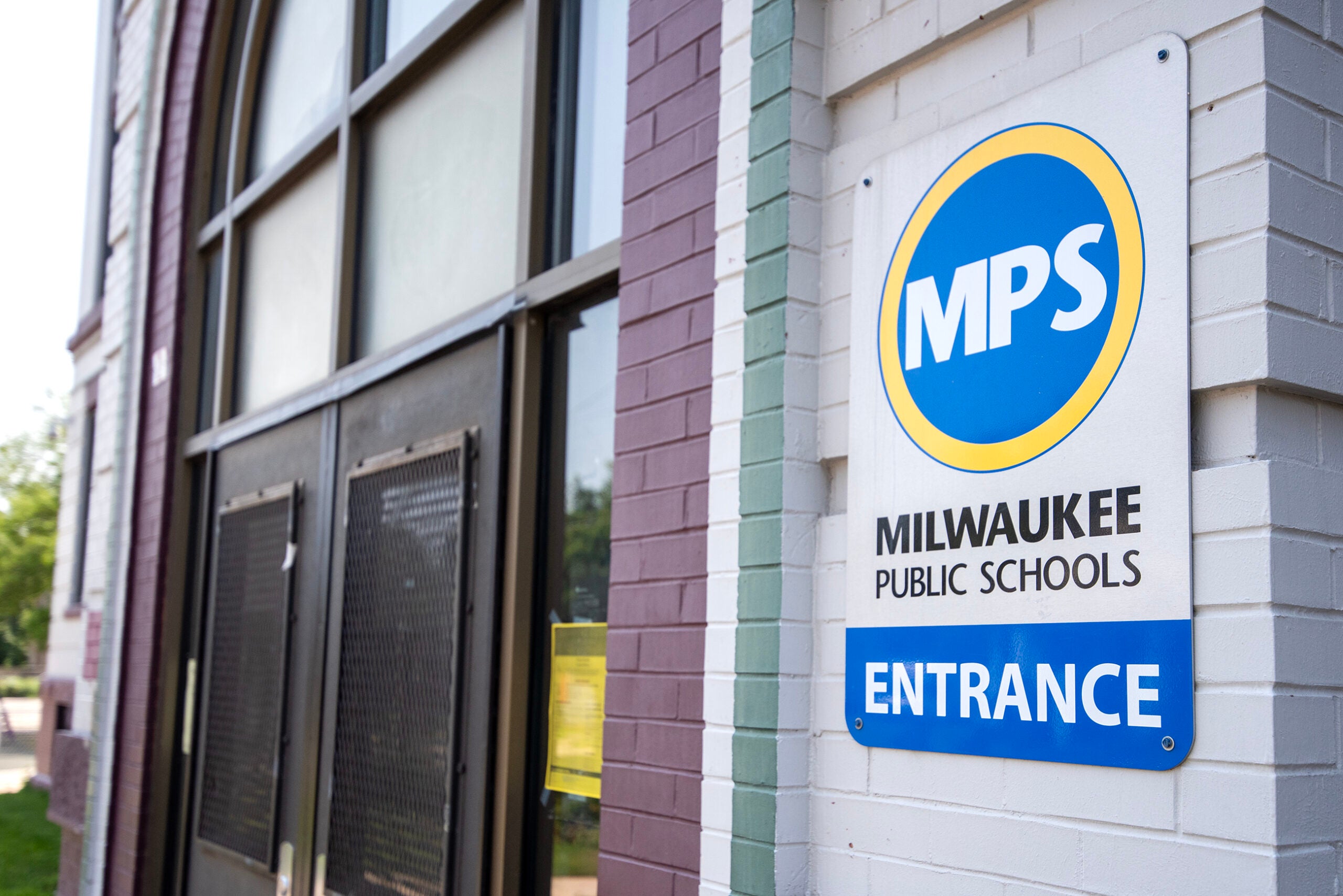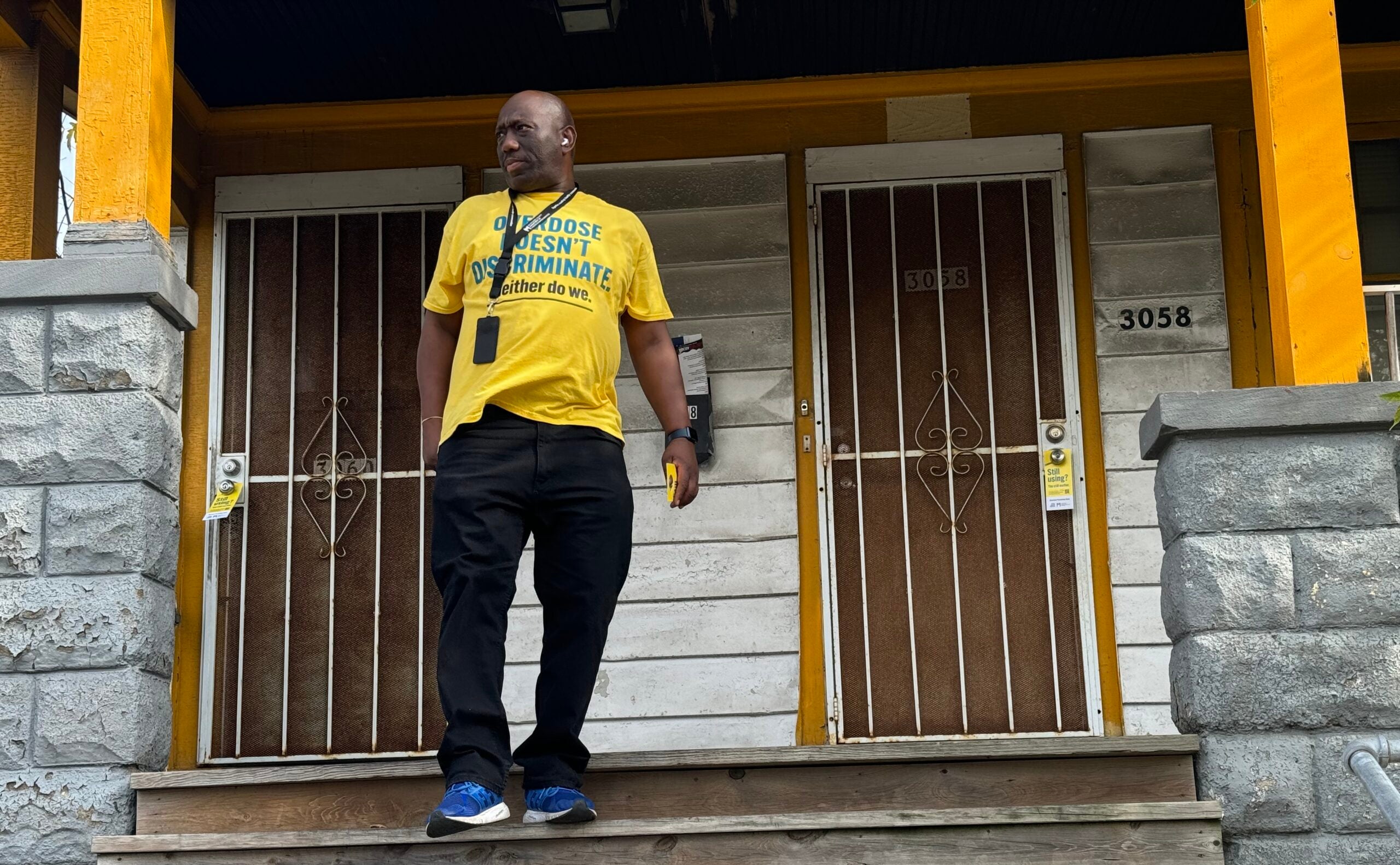It was late August 2022, and Cynthia Brown was getting agitated.
She was awaiting a $2.9 million check from the Wisconsin Department of Administration. Her Milwaukee-based business was floundering, and she needed the money.
“I am one of the grantees for the Diverse Business Grant and I need to set up a meeting … ASAP, as we are currently looking to lay off staff due to a funding shortage,” Brown said in a voicemail to the agency obtained by Wisconsin Public Radio.
News with a little more humanity
WPR’s “Wisconsin Today” newsletter keeps you connected to the state you love without feeling overwhelmed. No paywall. No agenda. No corporate filter.
A year later, Brown has become embroiled in a dispute with the state after DOA officials say she failed to account for how she spent pandemic relief funds she received.
Brown’s contract has been suspended and all recipients of the Diverse Business Assistance Grant program are now being or will be tracked by the end of the year, according to DOA.
The purpose of the grant was to assist nonprofits that helped small business owners who had trouble accessing capital and had been disproportionately impacted by the COVID-19 pandemic.
Records obtained by WPR show that she used a portion of the funds to pay contracts to businesses she owned herself, and other funds to pay for services provided by her sons and her husband, including public relations and security.
Brown also claimed in documents submitted to DOA she paid nearly $7,000 to state Sen. Lena Taylor, D-Milwaukee, an attorney, for legal services — which DOA flagged as suspicious. Taylor said in an interview Brown never paid her. Late Monday DOA said that Brown had provided updated documentation on Sept. 1 withdrawing from consideration expenses related to Taylor.
“DOA can’t speak to what type of professional relationship existed, if any, between (Taylor) and (Brown’s company),” a DOA spokesperson said in an email.
Among the purchases Brown made with the state grant were bowling parties worth more than $2,000 and, for $625, four-foot-tall lettering spelling out B-O-S-S.

The case highlights the challenges state departments faced in distributing an unprecedented amount of federal aid during the COVID-19 pandemic and the fact that, even years after many state grants were offered, policymakers and state officials are still trying to track down where some of the money went.
The federal government has reported $276 billion in potential COVID-19 aid fraud, a figure that aligns with an analysis done by the Associated Press.
State governments successfully distributed pandemic relief funding quickly, said Bob Westbrooks, former director of the Pandemic Response Accountability Committee, but too often, the money ended up in the wrong hands because of a lack of sufficient oversight at the federal and state levels.
Westbrooks’ committee, part of the Council of the Inspectors General on Integrity and Efficiency, was responsible for independent oversight of more than $5 trillion in COVID relief programs and spending.
“The swift distribution of funds and program integrity are not mutually exclusive,” Westbrooks said.
87 percent flagged as potentially ineligible
Brown founded CRC Employment and Entrepreneurial Services Inc. in 2015 as a nonprofit organization to “address the socioeconomic needs of disenfranchised communities and individuals through entrepreneurship and professional development,” according to the company’s website.
Brown, 53, also known as CeCe, describes herself on the site as a driven single mother who by age 34 had worked as a criminal justice director, as a district director for Sen. Taylor and as a chief financial officer for a large Black-owned construction company.
Brown’s experience and plans to help Black-owned businesses during the pandemic were enough to get her the $2.9 million Diverse Business Assistance Grant.
Although the money was potentially life-changing for a small business owner like Brown, it was just a small portion of the $73 million Diverse Business Assistance Grant Program Gov. Tony Evers announced in October 2021. And it was a fraction of the $5.7 billion the Evers administration received between March 2020 and June 2022 through federal COVID relief programs.
The Diverse Business Assistance program was created using funds from the 2021 American Rescue Plan Act passed by Congress and was meant to help small businesses owned by people disproportionately affected by the COVID-19 pandemic.
In Wisconsin, the program received 154 proposals seeking $127 million. Thirty-eight organizations, including Brown’s, received the grants.
Brown’s organization received a score of 21 points out of a possible 25 from DOA. Scores ranged from 6 to 25, according to documents obtained by WPR.The scoring categories were the applicant’s mission, experience and community served, whether the service would increase equity and their ability to leverage more funds.
Indianhead Community Action Agency, a nonprofit in Ladysmith, was given a score of 6 but still granted $1.3 million.
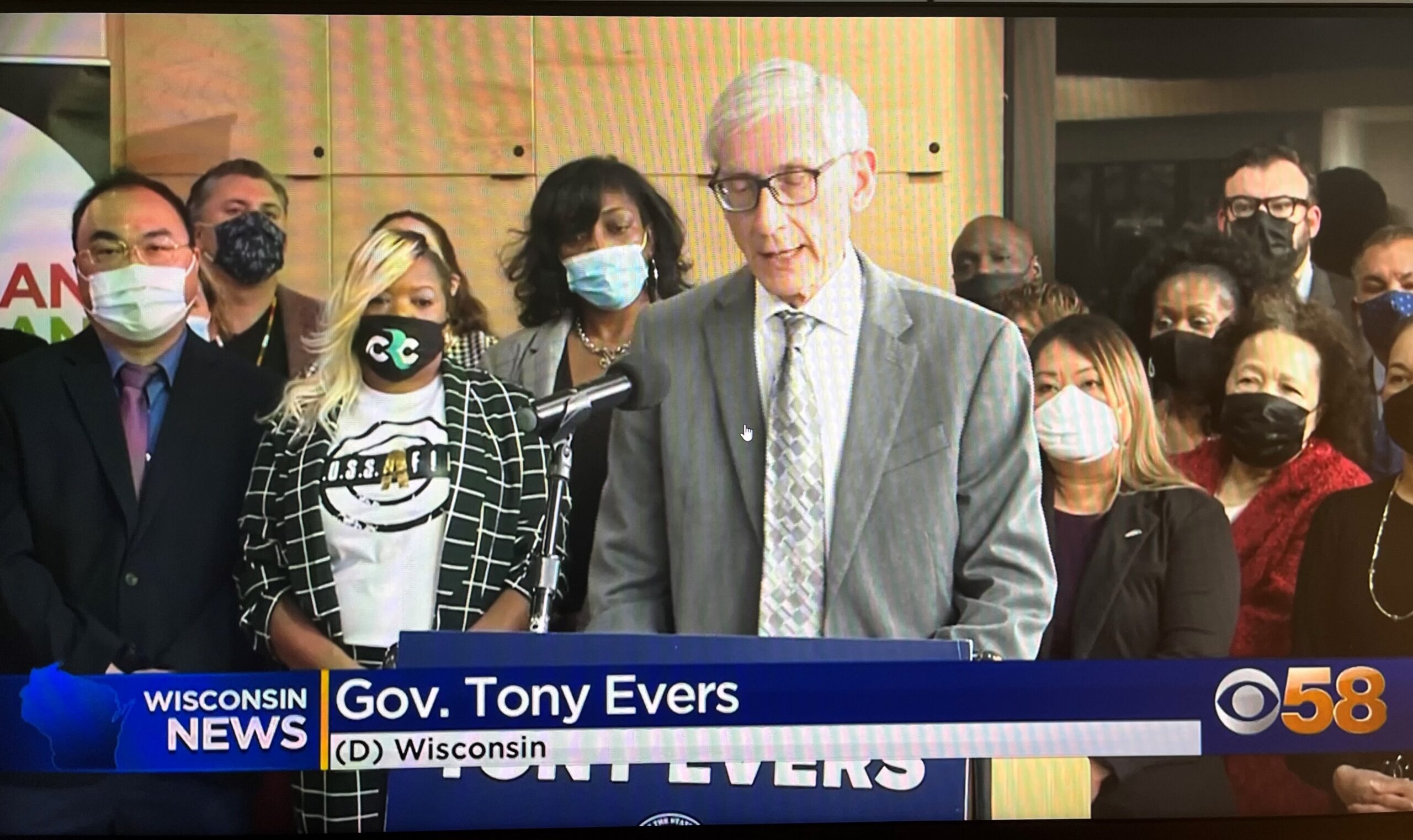
In March 2022, Brown stood in the front row at an event organized by the Evers administration to highlight the small business grant program.
Brown received her first $1 million payment in August 2022, just days after she left the voicemail message with state officials.
But by October, the Department of Administration had begun financial monitoring of CRC Employment and Entrepreneurial Services. On April 28, 2023 — more than three months after records requests related to Brown for this story were submitted — the state suspended Brown’s contract after investigators couldn’t verify how she was spending the money. It is the only Diverse Business Assistance Grant that has been suspended, according to DOA.
Records show Brown spent $1 million in five months.
In a letter to Brown’s attorney in late July, state auditors determined $130,905 of what Brown spent was eligible. The remaining $869,094 is potentially ineligible and Brown could be responsible for paying back the funds.
CRC executive paid herself with COVID funds
In her 12-page application, Brown said she planned to use the $2.9 million to “close the educational and technical assistance gap for 500 diverse businesses in the areas of administrative support, soft skills, networking and financial literacy to both new and established business owners in underserved communities of Wisconsin,” according to documents obtained by WPR.
She planned to host boot camps, night classes and one-on-one technical support.

Brown also told DOA in August 2022 that she had been working since March 2021 on programs to help Wisconsin small business owners by running technical assistance programs, hosting conferences on Wisconsin Bounce Back grants (an earlier form of pandemic assistance) and hosting conference calls on how to work with the Small Business Administration, DOA spokesperson Tatyana Warrick said.
In a Feb. 28 email, DOA officials asked Brown for documentation to show that work had been done.
Brown spent the entirety of the first grant payment — $1 million — between August and December 2022, providing the state with inadequate documentation of how her expenses meet the grant criteria, according to DOA documents.
After DOA was unable to verify Brown’s expenses and suspended her contract in April, she hired Milwaukee attorney Timothy Baldwin with JB Enterprises, a former financial investigator with the U.S. Treasury Department.
“It is not uncommon during an audit proceeding for information to be updated and for businesses to update their accounting records,” Baldwin told WPR in an email. “Once the financial review is complete you should have all the fact-finding you need to write your story.”
He did not respond to questions about how many workshops, programs or boot camps Brown held after receiving the grant money.
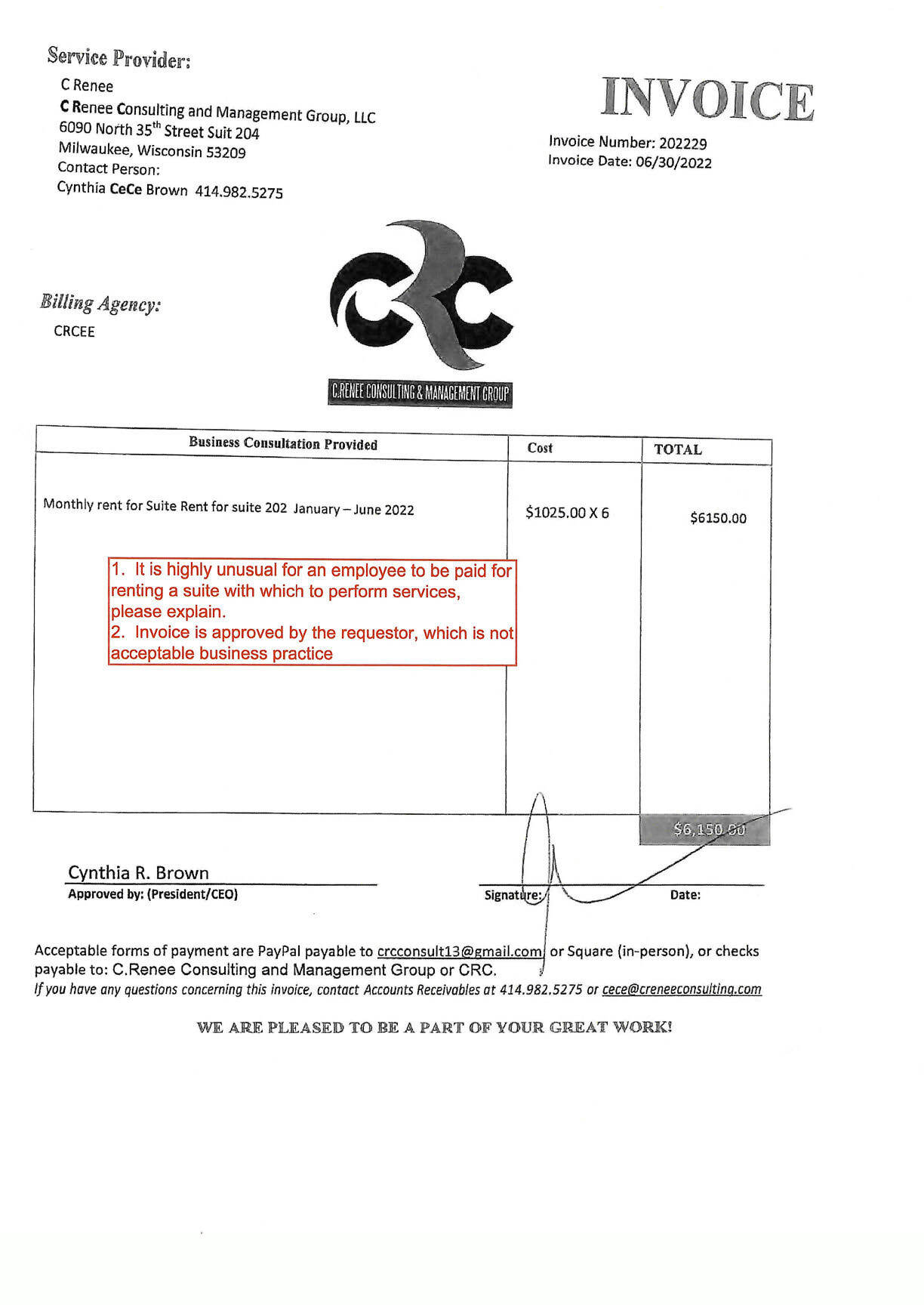
An example of a document Cynthia Brown submitted to the Department of Administration as part of its financial review, including questions raised by DOA. The department identified more than 86 percent of expenses as suspicious. Document obtained via open records request.
DOA administered more than a dozen programs using federal COVID-related funds totaling more than $1.7 billion.
Brown’s award is the only one being suspended, according to DOA. All recipients of the Diverse Business Grant program are now being or will be tracked by the end of the year, Warrick said.
Westbrooks said Brown’s situation is “disturbing and bothersome, but not at all surprising.”
“We saw fraud across the spectrum,” Westbrooks said. “Literally we had cases involving former NFL players, a former Olympic skater, rappers, a reality TV guy, pastors, police, politicians.”
In Cook County, Illinois, 48 clerk’s office employees either were fired or forced to resign amid an investigation of fraud in the Paycheck Protection Program.
“We made it way too easy to steal and misuse money,” Westbrooks said.
In the case of Brown’s company, some of the expenses that raised red flags for the state included:
- A handwritten receipt for $215,000 to rent an office for four months;
- A bowling party at Wauwatosa’s Bowlero for more than $2,000;
- Handwritten receipts for food from DoorDash deliveries and receipts from other Milwaukee-area restaurants totaling $338;
- Handcrafted plaques, keychains and signs, including the one spelling BOSS totaling $1,400;
- Yard signs and banners totaling more than $1,000;
- Multiple T-Mobile bills totaling more than $1,000.
In each case, Brown provided explanations to DOA for the purchases. For example, the BOSS letters were going to be used for “staging” and future company use; the bowling party was a networking event and to celebrate four graduates of her boot camp; the office rent was a down payment for an office building.
But DOA wasn’t convinced and continued to ask for more documentation.
Taylor denies receiving payment referenced in records
In an interview, Taylor confirmed Brown worked for her and said they have gone to the same church for years. Taylor also leases space from Brown for her Senate office. Taylor said she did pro bono legal work for her until 2021. She said she has never been paid for her services.
When asked why her name was included in documentation sent to DOA for payment, Taylor said WPR would have to ask Brown.
A spreadsheet sent to Brown by DOA shows that between Feb. 25, 2022, and Nov. 21, 2022, she paid herself or billed her other business, C. Renee Consulting and Management Group, 14 times, totaling $117,627.
Records show Brown’s son, LeeVan Roundtree Jr., was also collecting money as the organization’s communications director. Between Feb. 25, 2022 and Dec. 6, 2022, he was paid five times totaling $17,278 for his salary and bonuses.
Brown also paid $15,488 to a company listed as Time is Money for event security in October and December 2021 and then paid that same company $69,817 on Nov. 21, 2022 for “expenses directly related to rental property.”
Time is Money Enterprises LLC was registered to Brown’s other son, Keyon Roundtree, who was killed in a shooting in January 2022. The company was registered to Cynthia Brown’s husband, Roy Brown, but is now registered to Cynthia Brown.
Roy Brown also received $5,800 in September 2022 for “professional services.”
DOA also flagged the $215,000 payment from Cynthia Brown to Roy Brown, which she explained to the agency was part of a down payment for an office building at 8430 W. Capitol Drive in Milwaukee. She included a land contract document showing a $650,000 purchase agreement between seller Time Is Money, signed by Roy Brown, and her company with her signature on Nov. 21, 2022.
However, according to the Milwaukee Assessor’s Office, no such document was filed.
Instead, assessor records show Time is Money purchased the building from another seller on the same day for $485,500. Then, just last month, Time is Money sold it to her company for $450,000.
Brown’s two companies, CRC Employment and Entrepreneurial Services and C. Renee Consulting, are both in the Capitol Drive building along with Time is Money Enterprises, according to Milwaukee occupancy licenses.
Brown has not been charged with any crime. Baldwin, her attorney, declined to answer a detailed list of questions about Brown’s spending.
“The details of one specific organization and the facts surrounding prudent fiscal management decisions to ensure the integrity of the program, I am not at liberty to discuss,” he wrote to WPR.
The Diverse Business Assistance Grant wasn’t the first time Brown received public money.
CRC Employment and Entrepreneurial Services received a $75,000 Seed Accelerator Grant in fiscal year 2021 from the Wisconsin Economic Development Corp.
WEDC spokesperson David Callender said WEDC is currently reviewing that grant to “ensure there are no issues.”
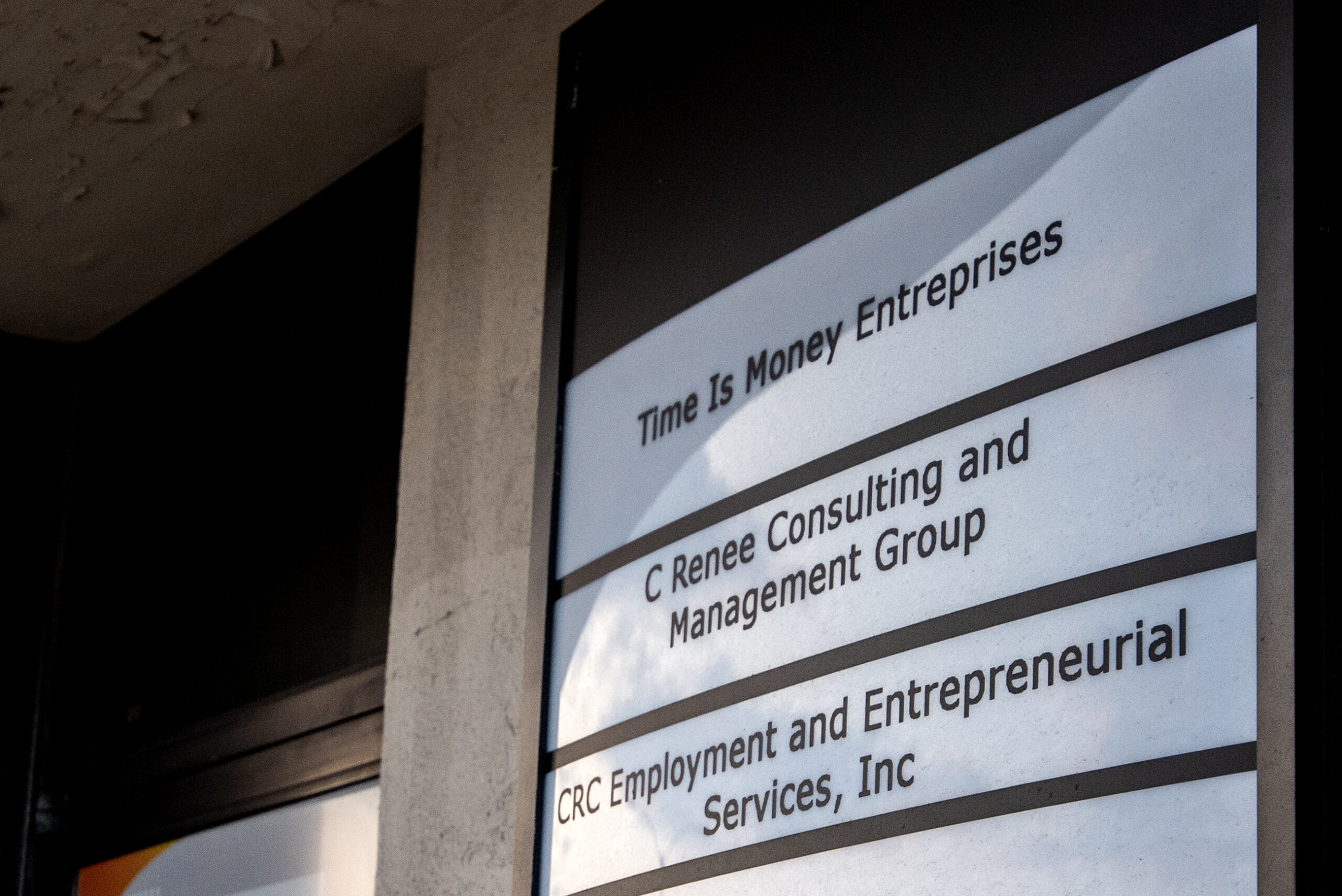
Huge sums moved quickly through state government
Republican lawmakers have repeatedly clashed with Evers over how to spend federal pandemic aid.
The GOP-led Legislature has twice introduced plans to advance a constitutional amendment that would strip the governor of sole authority over how federal funds are spent.
Under state law, the governor has broad discretion in distributing federal pandemic aid. Besides creating the Diverse Business Grant, Evers has used COVID relief funds on a range of things including shoring up school finances; the child care funding program Child Care Counts; maternal and infant health initiatives; and closing the deal on a conservation project in Ozaukee County after legislators blocked funds.
A Republican-requested audit released in December 2022 by the nonpartisan Legislative Audit Bureau found the Department of Administration did not provide auditors enough information showing how state officials made decisions about where to distribute the funds. At the time, the state had spent about $3.7 billion.
The report said auditors have information about the planned use of the remaining $1.9 billion, but did not specify what type of information auditors will receive.
Recently, Republicans who head the Joint Legislative Audit Committee received more than 300 pages in documents from DOA to investigate how the $3.7 billion has been spent.
In a May press release, Joint Legislative Audit Co-Chairs Sen. Eric Wimberger, R-Green Bay, and Rep. Robert Wittke, R-Racine, said the documents were “delivered to the (the audit bureau) so they can assess next steps and continue their work.”
“I’m frustrated by the lack of response to very specific questions about how the DOA made supplemental funding decisions and who was involved,” Wittke said. “We will continue to pursue evidence and shine a light on the lack of transparency of this administration.”
The federal CARES Act was signed by then-President Donald Trump in March 2020, giving state and local governments $150 billion. Wisconsin received $2 billion and the city of Milwaukee and Milwaukee and Dane counties received $260 million. States were supposed to spend that money by Dec. 30, 2020.
That proved impossible, so Congress extended the deadline by a year.
Meanwhile, the economy stalled, so Congress passed and President Joe Biden signed the American Rescue Plan Act, giving another $350 billion to state and local governments.
Westbrooks said there is plenty of blame to go around for the fraud and mismanagement of the billions of dollars of COVID aid. A total of 426 recovery programs were disseminating money, without guidance from the White House, he said. On the state level, not enough people were hired to make sure grant money was going to the right people.
“If Washington is going to be pushing out this amount of money, they need to have clear guidance,” Westbrooks said. “The folks who have to manage this money don’t have the resources. Should additional staff have been hired? Sure. But that’s not something that was written into the law.”
During an interview with Wisconsin Eye on July 31, DOA Secretary Kathy Blumenfeld said there have been no issues with transparency or how the money has been spent.
The department did not make Blumenfeld available for an interview with WPR or Wisconsin Watch. Warrick emphasized that the amount awarded and given to Brown is less than a tenth of a percent of the funds the Evers administration was authorized to distribute.
In the early days of the pandemic and with Trump facing reelection, Republican leaders urged Evers to spend the federal relief money quickly.
“While we wish circumstances were different so oversight was required, these new federal dollars do not appear to require any legislative oversight whatsoever,” Assembly Speaker Robin Vos and then-Senate Majority Leader Scott Fitzgerald sent Evers a letter on March 28, 2020 — the day after the CARES Act was signed.
While DOA continues to sort out Brown’s case, her attorney said she is providing explanations and audit adjustments to the state.
He said it’s not uncommon for businesses to update their records in response to an audit and noted that the investigation “continues to be an ongoing process that is intended to ensure total and complete compliance.”
On Sept. 14, a DOA spokesperson told WPR Brown’s attorney has requested more time to submit additional documents. DOA is now reviewing the documents.
This story was produced through a collaboration between WPR and Wisconsin Watch.
The nonprofit Wisconsin Watch (www.WisconsinWatch.org) collaborates with WPR, PBS Wisconsin, other news media and the University of Wisconsin-Madison School of Journalism and Mass Communication. All works created, published, posted or disseminated by Wisconsin Watch do not necessarily reflect the views or opinions of UW-Madison or any of its affiliates.
Wisconsin Public Radio, © Copyright 2025, Board of Regents of the University of Wisconsin System and Wisconsin Educational Communications Board.




